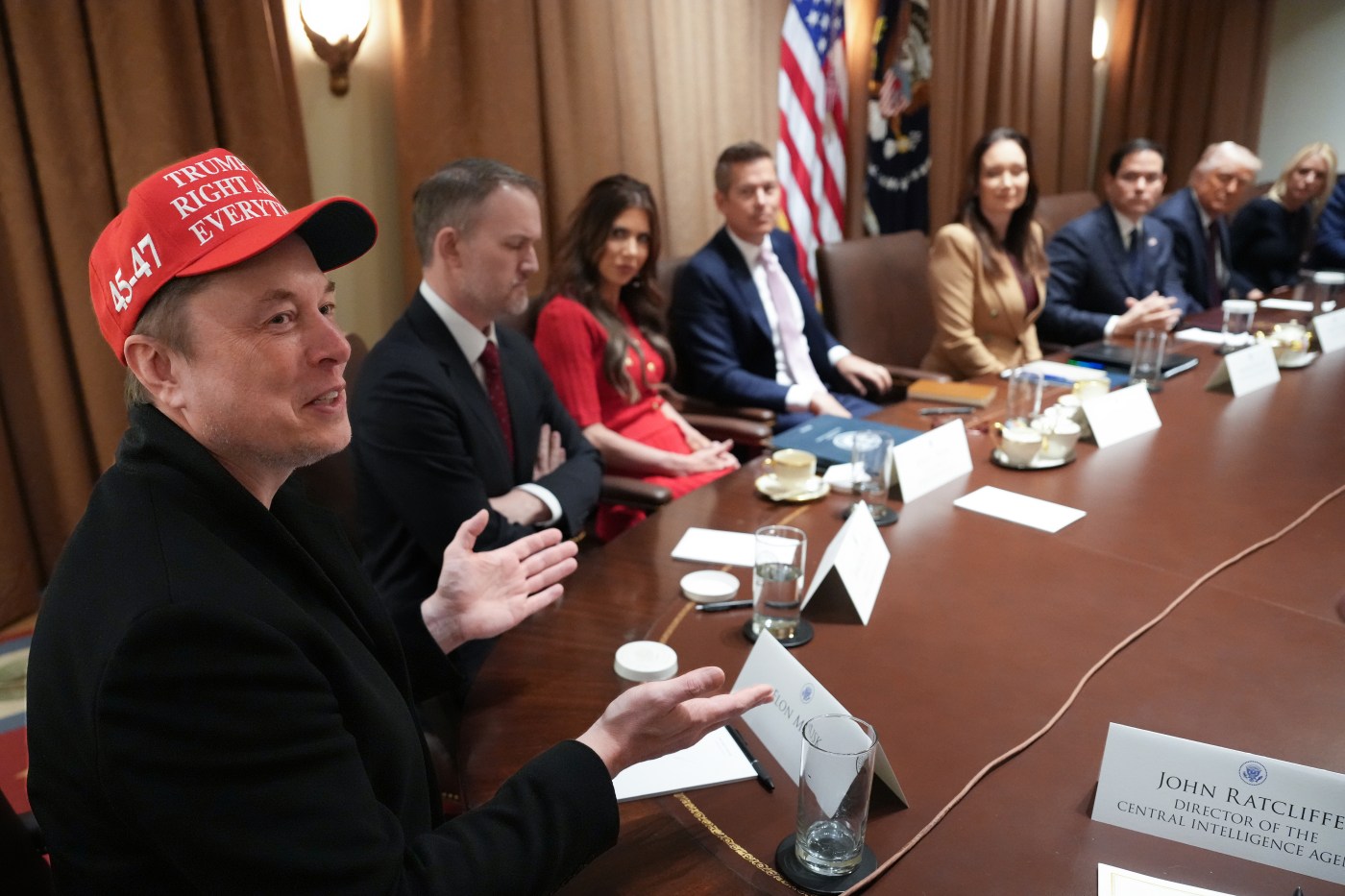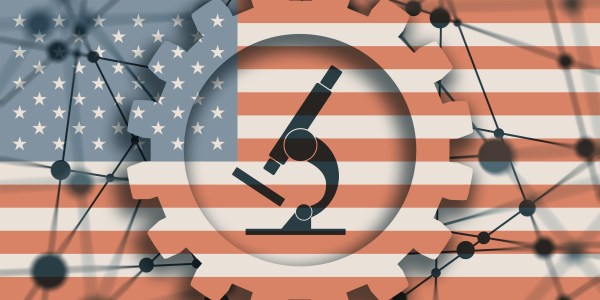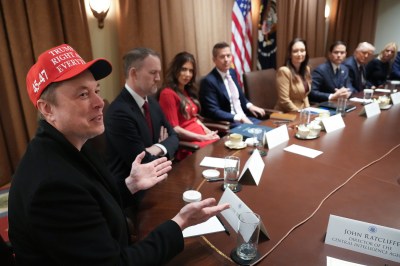In a much-vaunted interview last week on Fox News, anchor Bret Baier asked Elon Musk about the most “astonishing thing” the South African-born billionaire has learned during his brief tenure running the Trump administration’s Department of Government Efficiency. Ever the awkward showman, Musk delivered with a shocking but vague tale of incomprehensible government waste: a $1 billion customer-satisfaction survey.
“For example, the simple survey that was a literally 10-question survey you could do with SurveyMonkey, cost you about $10,000, was, the government was being charged almost a billion dollars for that,” Musk said as Baier gaped. “A billion dollars for a simple online survey, ‘Do you like the national park?’ and then there appeared to be no feedback loop for what would be done with that survey, so the survey would just go into nothing.”
It’s a hell of a story. The only problem? It isn’t true, at least not the way Musk tells it.
Individuals familiar with the digital operations at the Department of the Interior, where the National Parks Service (NPS) resides, tell me they have no knowledge of a contract for a $1 billion online survey, and that that number does not align with the department’s historically modest digital spending. The total appropriations in 2024 for the NPS came to $3.325 billion. Altogether, the Interior Department agencies received just over $15 billion.
A quarter of the national parks budget (and a significant portion of the entire department’s budget) going solely to an online survey would not be a mere scandal of government inefficiency. It would be absurd.
But what’s absurd is the vast gulf between Musk’s claim and the truth, which has been a hallmark of the entire DOGE process so far. Musk has argued that Social Security is a major source of fraudulent spending, despite actual audits and investigations over the years yielding no such evidence. His outrage over the number of noncitizens with Social Security numbers who could be therefore receiving benefits fraudulently is at odds with the law that requires the government to provide numbers to noncitizens who are legally authorized to work in the United States. And who can forget when DOGE posted on its website’s “wall of receipts” about an supposed $8 billion Immigrations and Customs Enforcement contract that turned out, in fact, to be just $8 million.
So what about this $1 billion survey? Let’s investigate.
Musk was seemingly supported in this claim by a post on his social-media platform X from the DOGE account, which stated the federal government had spent $75 million “to design website customer satisfaction surveys” and then “attempted to award $830 million to conduct similar surveys” before DOGE and the Interior Department put the kibosh on the proposal. There’s even a screenshot of five basic, simple questions that DOGE claims is an example of the unimpressive “work product” that tens of millions of wasted taxpayer dollars can get you. The tweet also noted that the Interior-based Federal Consulting Group (FCG), which had brokered this contract, had been dissolved.
Beyond this tweet, DOGE has done little to provide more details about the contracts or the FCG. When asked a series of questions about the specifics of the claims, a White House spokeswoman directed me to comments made by Interior Secretary Doug Burgum, who at the March 24 Cabinet meeting made the same claim. The contract was a “fraud,” President Donald Trump said in response.
But going on the information provided by the DOGE tweet, it’s likely Musk was referring to a proposed contract to provide customer-service support for several government agencies (not just one) over the course of up to five years. That’s the conclusion of Brendon Beebe, the co-founder of an e-commerce software company in Utah who in his spare time does comprehensive deep dives into publicly available government data when a particular claim catches his attention. He’s intimately familiar with a Request for Proposal (RFP), the standard document firms use to submit bids on federal contracts.
“I’m just a regular guy, politically liberal but frustrated with how superficial and polarized public debates have become,” Beebe told me. “I’ve personally responded to hundreds of software RFPs, and I’ve even seen government entities draft RFPs explicitly tailored for my company’s solutions.”
As he outlined in a post on his Substack, Beebe methodically searched government databases and came across a notice for a potential new customer-service contract, posted in October 2024 by the office at the Interior Department that houses the FCG. The details in the notice and “statement of work” documents appear to align with what Musk and DOGE were claiming, but with some significant and consequential differences.
“It called for a contractor to provide ‘comprehensive survey services’ across the government,” Beebe wrote, noting that the work would include everything from, yes, building and hosting surveys about the customer-service experience, to comprehensive analysis of those surveys, consulting for how to improve customer service, and ongoing technical support.
But that’s not all: The contract was to establish what’s known as a “Blanket Purchase Agreement” and would have been open to a large number of federal agencies, not just the NPS and not even limited to the Interior Department. And this work was not a one-time thing—the contract could have been extended to provide those services to any of the agencies who placed orders for up to five years.
Beebe also notes that the $830 million price tag cited by DOGE, while nowhere in the existing documentation, “likely referred to the ceiling value of a multi-year, multi-agency contract rather than a one-time expenditure.” Final spending on a contract like that can often be much lower and would depend on the number of agencies that placed orders, and for how long.
None of Beebe’s findings indicate an actual contract was written or even, as DOGE has claimed, that it was on the verge of being signed before the Trump administration heroically intervened. Nor can Beebe or I find evidence of an RFP. All publicly available documentation suggests this massive contract as described by Musk and DOGE did not, strictly speaking, exist.
Now what of that initial $75 million survey for the NPS? That’s even less clear, but Beebe has hit on a potential explanation. There is an existing contract first awarded in 2023 for a five-year period, coded to “market research/public opinion” and brokered by the FCG at Interior. That contract has a ceiling of $96 million, with $19 million of that already paid to the contractor through the first couple months of 2025. That gets us into the ballpark of DOGE’s assertion there is a “$75 million contract to design website customer satisfaction surveys,” but it still doesn’t fit with their story.
Neither the White House nor the Interior Department has answered my detailed questions about whether these documents discovered by Beebe are the same as what DOGE has claimed. But given Musk’s track record in government so far, why should they respond? His team may talk a big game on transparency, but its “wall of receipts” is a mess, difficult to navigate, and limited in information. Verifying any of these claims requires lots of time and familiarity with the complexities of government contracts and the databases that contain information about them.
As Beebe notes, the procurement process seems ripe for improvements that could lower costs: These sorts of blanket purchase agreements have the effect of driving out smaller firms and allowing larger contractors to raise their prices.
But Musk appears as interested in reforming how government contracts are awarded as he is in true transparency. It takes a lot of time, effort, knowledge, and patience to reorient the federal government toward greater efficiency. Attention to details and precision are more effective than speed and brute power; more scalpel, less chainsaw. Musk seems to prefer telling stories—tall tales, really—that cause Bret Baier to drop his jaw, prompt Fox News viewers to get angry, and leave Americans with a distorted and incomplete view of their government.







Please note that we at The Dispatch hold ourselves, our work, and our commenters to a higher standard than other places on the internet. We welcome comments that foster genuine debate or discussion—including comments critical of us or our work—but responses that include ad hominem attacks on fellow Dispatch members or are intended to stoke fear and anger may be moderated.
With your membership, you only have the ability to comment on The Morning Dispatch articles. Consider upgrading to join the conversation everywhere.